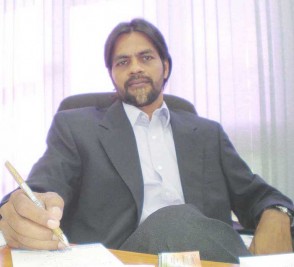GT&T’s Chief Executive Officer (CEO) Yog Mahadeo is predicting a challenging new year for the company with the looming introduction of new telecommunications legislation but says it is still planning to plug some US$18M into the sector.
Addressing the media at the company’s Brickdam headquarters yesterday, Mahadeo said that after studying the draft legislation, GT&T was left with numerous concerns which could create investor and consumer uncertainty if not addressed. He stated that the company was not afraid of competition but called for the rules to be fair and applied even-handedly. “In our opinion, the proposed law and regulations do not reflect an understanding of the challenges of Guyana and/or the telecommunication sector as a whole,” he said. “Would it not amount to a rewarding of illegality if a currently illegal operator is automatically granted a licence with the introduction of the new legislation?” he queried.
According to Mahadeo, it appears that the absence of stern penalties for bypass in the new legislation may suggest that there is a belief that the illegal activity will disappear with the introduction of greater competition.
Four new companies are to receive operating licences under the new legislation—Quark Communications Inc., Nexlink Communications, I-Net and E-Networks.

Mahadeo said, “…We are concerned that newcomers may or may not be required to comply with the same set of rules as we had to–for example, interception, spectral fees, licence fees, VAT collection and remittance etc.
“It is also our concern that newcomers will hide under the covers of VoIP (Voice over Internet Protocol) to cover a massive voice network while not being regulated for same – and we have already seen public advertisements which have apparently deluded the authorities.”
His VoIP remark was in reference to cheap internet calls being offered by internet cafés and some other businesses. Mahadeo said with the advent of the new regulations, the company anticipates “significant reductions in both international settlement rates and the volume of GT&T’s international traffic.” He also pointed out that there will be increased local services competition from operators who will not be required to make their own investment but would be allowed to “free-ride on others.”
The new law, Mahadeo added, would also bring increased regulatory scrutiny on parts of GT&T’s business which are presumed to be dominant, leading to increased costs for the company to facilitate “regulatory impositions.”
In response to a question, Mahadeo said he believed the draft law should be made available to the wider public even as he acknowledged that they were unclear about whether the government intended to go that route. “What we can only say is that we hope there is (public scrutiny) because it calls for careful scrutiny, it calls for a lot of analysis and in the age of technology and information and communication, definitely open communication,” he said.
Meanwhile, Mahadeo also noted that the company has been investing between US$15M and US$20M annually and this will continue. “We continue to do that and that is our plan. In fact, our Board has recently approved another (US)$18M for us to develop this new network for next year.”
The company is also on the brink of extending its E-magine Broadband network with work ongoing at Eccles, Nandy Park and Diamond/ Grove and, according to Mahadeo, those areas could have the service by mid-January.
He added that GT&T will also be reviewing the price structure and offering discounts to those internet subscribers who are unable to access E-magine Broadband.









